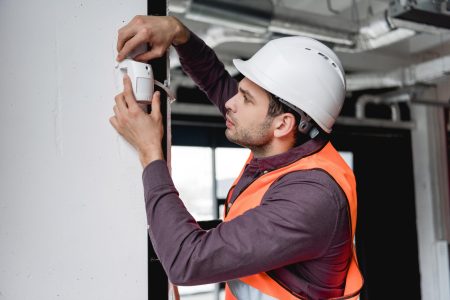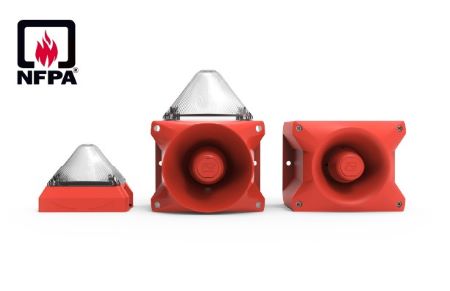Fire alarms are the first early warning signals of a fire. Fire Buyer takes you through how to choose the best standardised system for your organisation
In order for you to have fire safety there must be a way for you to have an early fire warning. In case an untoward fire happens when you have a fire alarm this can immediately be put off because people are immediately alerted about it. Thus it will be prevented from wreaking more havoc in one’s home.
When it comes to fire alarms people often think that such a small alarm is only necessary inside the home. But actually you also need to install an external smoke detector. This will make sure that if the untoward fire happens outside your home it can be contained immediately so that it doesn’t get to your house.
Because we are living in a high-tech world now it has become easy to purchase systems or gadgets that we can use in our home or establishment. This is the same with the fire prevention system that includes the external smoke detector. You can easily look at the websites online of the companies that supply such systems and make a comparison of their features. Of course it is also crucial that you compare the price that they charge for such kinds of systems. This is what you need to do when you are getting a fire prevention system for your home or establishment.
There are so many different alarm systems that are available in the market, and choosing the right one for your premises might not be an easy task. Choosing the right external smoke detector, or even a combination of detectors will be very important to ensure that fire will be detected at the earliest point in case of break out.
However, you will also need to make sure that you consider other factors like minimising the risk of having a false alarm. Fire detectors are designed in such a way that they will detect at least one of the four characteristics of fire which are smoke, fire, combustion gas as well as infrared or the ultraviolet radiation. In case one of these characteristics is identified, then the detector will trigger an alarm. There are several different fire alarm systems that you will come across in the market, and they are all designed to trigger an alarm. One of the most common fire alarm systems is the smoke detector.
When you are choosing an outside camera system, then you will need to make sure that you chose one according to the environment where it is being used. Ensure that you have conducted adequate research about the kind of fire alarm system that will suit your needs. Not every fire alarm system that you will come across will be the right one for you as they will depend on several factors. There are some considerations that you will need to keep in mind when you are looking for a fire alarm system so that you make the right choice. You want to make sure that the fire will be detected at the earliest point and this will only be possible when you have the right alarm system in place.
When you are thinking of installing an external fire detection system in your home, it will be an important thing for you to ensure that you work with a professional who well understands these detectors. If you don’t know exactly what you are supposed to check, ensure that you look for an expert who will assess your place and determine which will be the right fire alarm system for you. Seeking the help of a professional will also ensure that you are not confused and it will even make the process easier and less stressful for you, and you shall also achieve the best fire alarm system for you.
The necessities
Many people do not have fire alarm systems installed in their homes. Many assume that they are able to smell smoke when they are asleep and wake up in time to escape in case of a fire emergency. Well, this is not true at all. Studies have been conducted and it has been proven that people’s sleep is disrupted when there is sound or noise, but it is NOT the case with smell. Our sense of smell is lost when we are asleep, and we will not wake up no matter how strong the smell of smoke is.
Many people do not take fire alarms seriously, and many do not test or check their alarm systems regularly. The only thing that can alert you, your family and colleagues 24/7 from a fire is the sound of a well installed and maintained fire alarm system. Fire alarms are important because they can give you an early signal to something that could be tragic – basically saving your lives.
A fire alarm alerts you when you are busy, working or sleeping. You can therefore take action before major damage takes place, thus saving you the cost of property loss- also saving insurance companies a lot of damage cost. More than half of house fires take place in homes that do not have fire alarms, and mostly at night, resulting in a high number of deaths. It is easy to get trapped in the start of a fire.
An early detection can get you out of a situation that would potentially turn into a tragedy. Make sure to also alert your family and friends on the importance of installing fire alarm systems.
Here are a few safety and maintenance tips for you to keep in mind:
- Install a fire alarm in every room of a house especially where you sleep, and in every office of an organisation.
- Check your batteries of signs of corrosion or battery life. Replace the batteries once a year.
- Make sure you teach your children what to do when they hear the sound of a fire alarm.
- Test the fire alarms at least once a month.
- Do not paint over fire alarms or stick anything on them, as that could interfere with its functioning.
Commercial fire alarms
Current UK fire alarm regulations state that all business premises must have ‘an appropriate fire detection system’. This basically means that an outbreak of fire can easily be detected and occupants can easily be warned. This does not necessarily mean that all business premises will need a fire alarm system.
You are unlikely to need a fire alarm system if all of the following statements are true:
- Your premises are small, simple, and single-storey or open-plan
- You don’t store any high-risk substances, such as chemicals
- You don’t undertake any high-risk activities, such as cooking
- You don’t have any vulnerable occupants, such as the very young, elderly or disabled
- A fire would be easily spotted if it broke out anywhere in the premises
- A shout of ‘fire!’ would be easily heard by all occupants
- If one or more of these statements does not apply to your business, then you probably need a fire alarm system.
If you are in any doubt, then your Fire Risk Assessment should specifically state whether you should or shouldn’t install automatic fire detection.
What type of alarm do I need?
There are 3 main types of fire alarm system: conventional, addressable, and wireless:
Conventional Fire Alarm
– divides your premises into broad zones
– in the event of an alert, the fire alarm panel identifies the zone, but not the precise area
– most suitable for smaller or lower risk environments
Addressable Fire Alarm
– each individual device has its own unique electronic address
– if one activates, the fire alarm panel tells you precisely where the problem is
– most suitable for larger or higher risk environments – e.g schools, care homes, hospitals
Wireless Fire Alarm
– uses a secure wireless link between the sensors and the fire alarm panel
– typically works like an addressable system, just without the wires
– most suitable for premises which don’t want lots of cable – e.g. churches, historic buildings
UK fire alarm legislation doesn’t specify exactly which each type of fire alarm system should be used in which types of premises, again, it comes down to what is ‘appropriate’ for your particular business.
To make sure you get the right fire alarm system to meet UK fire alarm regulations, it is recommended that you use a reputable fire safety company to design it. You should also make sure they design to BS 5839 specifications (the relevant British Standard), otherwise, you may not be covered for regulatory or insurance purposes.
Fire alarm system ‘grades’ and ‘categories’?
This is a complex area but basically ‘grades’ and ‘categories’ respectively define how your fire alarm system should be constructed (grades), and which areas of your building it should cover (categories).
Grades: Fire alarm grades run from ‘A’ through to ‘F’, with ‘A’ being the highest grade and ‘F’ being the lowest. Residential buildings can usually meet UK fire alarm regulations with a lower-grade system (D-F). These are not wired into a central control panel, and may not have back-up battery power. However, businesses generally need a more substantial system to comply with UK fire alarm legislation – from ‘A’ through to ‘C’ grade.
At a very simplistic level, these higher-grade systems are wired into a central fire alarm panel, connected to the mains power supply, and also have a back-up power supply. Which grade and category of fire alarm system you need is very much dependent on the nature of your business and the size and layout of your premises.
Again, the grade and category of fire alarm system you need should be specified in your Fire Risk Assessment, or advised by whoever is designing your fire alarm system (don’t forget to make sure this conforms to British Standard BS 5839.)
Categories: There are 2 main fire alarm categories: Category ‘P’ systems, which protect property and Category ‘L’ systems, which protect life.
Servicing
UK fire alarm regulations only state that your fire alarm system must be ‘adequately maintained’, however BS 5839 recommends that a fire alarm system should be inspected by a competent person at least every 6 months and the government recommends following this standard.
In fact, if you work out of large premises, we would recommend a quarterly service, as there are many more components to your fire alarm system, and therefore more opportunities for something to go wrong.
There are 2 main reasons to keep your fire alarm in working order:
- To alert occupants in the event of fire and so prevent loss of life
- To prevent false alarms
Whilst the 1st reason may seem obvious, the 2nd reason is less well known.
The fact is that false alarms account for a huge number of fire brigade call-outs. This incurs a lot of expense and, more importantly, could mean that the fire brigade is otherwise occupied when a real emergency arises.
The fire brigade has now imposed charges for call-outs at premises which have a high number of false alarms, as an incentive for businesses to keep their fire alarms better maintained.
Alarms are integral to the fire prevention industry, they help to save lives, protect property and protect assets. Without alarms, there would be little to no form of detection and fire safety would be reliant on fire suppression systems. Alarms are becoming smarter and more connected and integrated with other fire protection systems as well as security systems. The industry will continue to innovate.
Commentary: Dr Jim Glockling, Technical Director of the Fire Protection Association and RISCAuthority
There are two main types of fire alarm systems available. These are manual and automatic.
The manual fire alarm system requires a person to activate the fire alarm by a manual call point (outstation), which will register on the fire alarm panel (master station). The outstations are required to be located on escape routes and fire exits, with additional outstations in higher risk areas such as plant rooms, commercial kitchens and laundries.
An automatic fire alarm system is activated automatically by either smoke or heat detection and will also have the ability for a user to manually raise the alarm by an outstation, which again will register on the master station.
Fire alarm systems in commercial or business premises are available as two variants, conventional or addressable. Firstly, a conventional fire alarm system will see a detected fire (whether by automatic fire detection systems or the activation of a fire alarm manual call point) registered on the fire alarm control panel as in one of the identified zones, such as the ground floor, warehouse or plant room, depending on how the system was designed and installed. The second type is an addressable fire alarm system, where a detected fire (whether by automatic fire detection systems or the activation of a fire alarm manual call point) is registered on the fire alarm control panel as a specific location or address within a zone, such as via an automatic smoke detector in the ground floor boiler room, or a fire alarm manual call point by the ground floor rear fire exit.
The type of fire alarm system required in your premises should be identified within the current fire risk assessment.
Commentary: James King, Director of Connected Homes, FireAngel
There has been a real shift in behaviour and circumstance due to coronavirus and housing providers are under increasing pressure, specifically with regard to fire safety.
Our new agreement with Ealing Council will revolutionise the way in which the council monitors and manages its housing stock, eliminating the requirement to gain physical access to its properties due to all of the required IoT device data being transmitted wirelessly in real time via a secure cloud network. The FireAngel Connected Gateway uses a unique algorithm and features patented Predict technology to identify and highlight high-risk patterns of behaviour regarding fire safety and then instantly alerting nominated individuals in the event of an alarm.
From challenges around gaining access to properties through to overcoming issues regarding the adequate measurement of property risk, there are a number of complications and costs associated with missed tenant appointments and the difficulty engineers experience when trying to gain access to properties to conduct necessary maintenance and repairs. This is why connected technologies that support remote monitoring capabilities are so important, because they enable housing providers such as Ealing Council to continuously monitor each of the fire and carbon monoxide safety devices across their stock via a central, secure cloud-based system.
Pete Davies, our Business Development Manager, Fireco
The Regulatory Reform Fire Safety Order and Building Regulations, which form the basis of fire safety law in England and Wales, requires general fire precautions and that occupants of a premises be given sufficient early warning in the event of a fire. With few exceptions, this comes in the form of automatic alarm and detection equipment, commonly known as a fire alarm. The legal requirement for this equipment forms the basic necessity, but the importance of having this type of apparatus extends even further.
Fire alarms not only give us the ability to warn people of danger but also to operate automated systems which allow us to protect our buildings. For example, without automatic detection, we can’t use hold-open devices for fire doors. These are vital for ensuring that fire doors are not wedged open and are able to close safely in an emergency, preventing smoke and fire from travelling through the building and causing damage that could bankrupt some businesses. These devices rely on some form of equipment which can detect smoke or heat, which could indicate a fire, in order to operate.
If you’re unsure if your premises needs a fire alarm system, you should have a suitable fire risk assessment carried out and seek guidance from your local fire and rescue authority. I don’t think it’s an overstatement to suggest that it could literally be the difference between life and death, and could save your business from financial ruin, should the worst happen in your building.
To stay up to date on the latest, trends, innovations, people news and company updates within the global fire market please register to receive our newsletter here.
Media contact
Rebecca Morpeth Spayne,
Editor, International Fire Buyer
Tel: +44 (0) 1622 823 922
Email: editor@firebuyer.com









